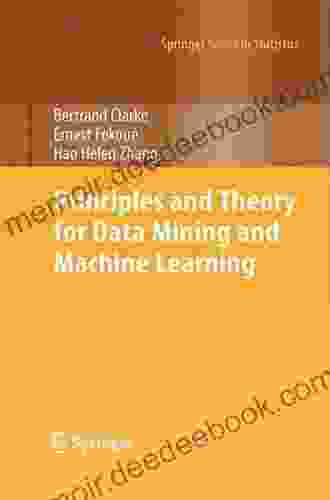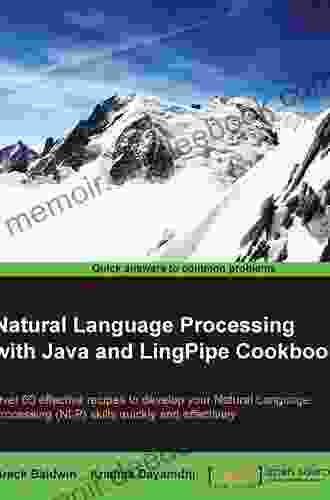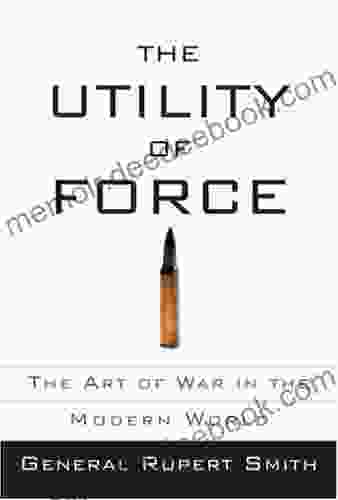The Utility of Force: Rupert Smith's Indispensable Guide to Military Strategy

4.5 out of 5
| Language | : | English |
| File size | : | 1294 KB |
| Text-to-Speech | : | Enabled |
| Screen Reader | : | Supported |
| Enhanced typesetting | : | Enabled |
| Word Wise | : | Enabled |
| Print length | : | 450 pages |
| X-Ray for textbooks | : | Enabled |
Rupert Smith's seminal work, The Utility of Force, stands as a towering achievement in the field of military strategy. First published in 2005, this magisterial tome has profoundly influenced military thinkers, practitioners, and policymakers alike. Smith's incisive analysis and unparalleled insights into the nature, conduct, and consequences of military power have made The Utility of Force an indispensable guide for understanding the complex dynamics of war and conflict.
At the heart of Smith's argument is the notion that force is a necessary, but ultimately limited, instrument of policy. He contends that while force can be employed to achieve a wide range of political objectives, its utility is always constrained by a number of factors, including moral, legal, and political considerations. Smith argues that the decision to use force should never be taken lightly, and that it should only be employed as a last resort, when all other means of achieving the desired outcome have failed.
Smith's analysis of the utility of force is informed by a deep understanding of history, philosophy, and international relations. He draws on a wide range of case studies, from ancient Greece and Rome to the American Civil War and the Second World War, to illustrate the complex relationship between force and politics. Smith argues that while force can sometimes be used to achieve short-term gains, it is often counterproductive in the long run. He notes that the use of force can lead to unintended consequences, such as civilian casualties, increased instability, and the erosion of public support for the war effort.
In addition to his analysis of the utility of force, Smith also provides a comprehensive framework for understanding the conduct of war. He argues that wars are complex social phenomena that cannot be reduced to a simple clash of armies. Smith emphasizes the importance of understanding the political, economic, and social factors that drive wars, and he argues that military strategies must be tailored to the specific circumstances of each conflict.
Smith's work has had a profound impact on the way that military strategists think about the use of force. His insistence on the limited utility of force has led to a more nuanced understanding of the role of military power in international relations. Smith's work has also helped to bridge the gap between academia and the military, and it has become a standard text in military academies around the world.
The Utility of Force is a challenging and thought-provoking work that offers a unique perspective on the nature of war and conflict. Smith's incisive analysis and unparalleled insights make this book an essential reading for anyone who wants to understand the complex dynamics of military power.
Key Concepts
The Utility of Force is a complex and nuanced work, but at its core are a number of key concepts that Smith uses to analyze the nature, conduct, and consequences of military power. These concepts include:
- The limited utility of force: Smith argues that force is a necessary, but ultimately limited, instrument of policy. He contends that while force can be employed to achieve a wide range of political objectives, its utility is always constrained by a number of factors, including moral, legal, and political considerations.
- The unintended consequences of force: Smith argues that the use of force can often lead to unintended consequences, such as civilian casualties, increased instability, and the erosion of public support for the war effort.
- The importance of understanding the political, economic, and social factors that drive wars: Smith argues that wars are complex social phenomena that cannot be reduced to a simple clash of armies. He emphasizes the importance of understanding the political, economic, and social factors that drive wars, and he argues that military strategies must be tailored to the specific circumstances of each conflict.
Insights
Smith's analysis of the utility of force offers a number of profound insights into the nature of war and conflict. These insights include:
- The decision to use force should never be taken lightly: Smith argues that the decision to use force is a grave one, and that it should only be employed as a last resort, when all other means of achieving the desired outcome have failed.
- Force is often counterproductive in the long run: Smith argues that while force can sometimes be used to achieve short-term gains, it is often counterproductive in the long run. He notes that the use of force can lead to unintended consequences, such as civilian casualties, increased instability, and the erosion of public support for the war effort.
- Wars are complex social phenomena: Smith argues that wars are complex social phenomena that cannot be reduced to a simple clash of armies. He emphasizes the importance of understanding the political, economic, and social factors that drive wars, and he argues that military strategies must be tailored to the specific circumstances of each conflict.
Enduring Value
The Utility of Force is a book that has stood the test of time. It remains one of the most important and influential works on military strategy ever written. Smith's incisive analysis and unparalleled insights make this book an essential reading for anyone who wants to understand the complex dynamics of war and conflict.
The enduring value of The Utility of Force lies in its ability to provide a framework for understanding the use of force in a variety of different contexts. Smith's analysis is equally relevant to the study of conventional warfare, counterinsurgency, and peace operations. His work has also been used to inform policy decisions on issues such as the use of drones, the fight against terrorism, and the prevention of genocide.
The Utility of Force is a challenging and thought-provoking work, but it is also an essential one. It is a book that will continue to be read and studied by military strategists, policymakers, and scholars for generations to come.

4.5 out of 5
| Language | : | English |
| File size | : | 1294 KB |
| Text-to-Speech | : | Enabled |
| Screen Reader | : | Supported |
| Enhanced typesetting | : | Enabled |
| Word Wise | : | Enabled |
| Print length | : | 450 pages |
| X-Ray for textbooks | : | Enabled |
Do you want to contribute by writing guest posts on this blog?
Please contact us and send us a resume of previous articles that you have written.
 Book
Book Text
Text Story
Story Library
Library Newspaper
Newspaper Paragraph
Paragraph Glossary
Glossary Bibliography
Bibliography Preface
Preface Synopsis
Synopsis Annotation
Annotation Scroll
Scroll Tome
Tome Bestseller
Bestseller Narrative
Narrative Biography
Biography Autobiography
Autobiography Reference
Reference Encyclopedia
Encyclopedia Dictionary
Dictionary Librarian
Librarian Catalog
Catalog Borrowing
Borrowing Stacks
Stacks Archives
Archives Periodicals
Periodicals Lending
Lending Reserve
Reserve Journals
Journals Reading Room
Reading Room Rare Books
Rare Books Special Collections
Special Collections Interlibrary
Interlibrary Study Group
Study Group Thesis
Thesis Storytelling
Storytelling Awards
Awards Reading List
Reading List Book Club
Book Club Theory
Theory Susan Page Davis
Susan Page Davis Lori London
Lori London Debby Mcmullen
Debby Mcmullen Bruno Palvarini
Bruno Palvarini Emily J Dolbear
Emily J Dolbear Jean Pierre Corriveau
Jean Pierre Corriveau Dmitry I Ignatov
Dmitry I Ignatov David Ellefson
David Ellefson John David Dingell
John David Dingell Ralph Pauley
Ralph Pauley George Yool
George Yool Michael Calvin
Michael Calvin John Kruth
John Kruth Joel M Charon
Joel M Charon Teresa Wilms Montt
Teresa Wilms Montt Karen Ritchie
Karen Ritchie Patrick Brislan
Patrick Brislan Kristin Riddick
Kristin Riddick Scott Rogers
Scott Rogers Linda Goldman
Linda Goldman
Light bulbAdvertise smarter! Our strategic ad space ensures maximum exposure. Reserve your spot today!

 Dallas TurnerLearn How To Analyze People With The Secrets Of Manipulation Mind Control And
Dallas TurnerLearn How To Analyze People With The Secrets Of Manipulation Mind Control And Ernest PowellFollow ·11.8k
Ernest PowellFollow ·11.8k Justin BellFollow ·6.8k
Justin BellFollow ·6.8k Jamie BellFollow ·13.7k
Jamie BellFollow ·13.7k Dan HendersonFollow ·18k
Dan HendersonFollow ·18k Bob CooperFollow ·17.4k
Bob CooperFollow ·17.4k Desmond FosterFollow ·2.7k
Desmond FosterFollow ·2.7k Floyd RichardsonFollow ·18.7k
Floyd RichardsonFollow ·18.7k Alfred RossFollow ·2.3k
Alfred RossFollow ·2.3k

 Vernon Blair
Vernon BlairHow to Get a Woman to Pay for You: A Comprehensive Guide...
In the modern dating...

 Levi Powell
Levi PowellPrinciples and Theory for Data Mining and Machine...
Data mining and machine learning are two...

 Andrew Bell
Andrew BellMirrors For The Mind: Milestones In Discovery And...
Mirrors have been a part of human history...

 Alec Hayes
Alec HayesDelving into Natural Language Processing with Java and...
Natural Language Processing (NLP) is an...
4.5 out of 5
| Language | : | English |
| File size | : | 1294 KB |
| Text-to-Speech | : | Enabled |
| Screen Reader | : | Supported |
| Enhanced typesetting | : | Enabled |
| Word Wise | : | Enabled |
| Print length | : | 450 pages |
| X-Ray for textbooks | : | Enabled |














